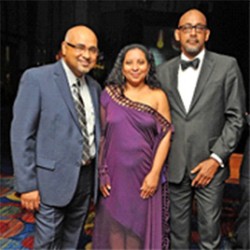(Trinidad Express) The Caribbean needs to take the next step and use technology not just for entertainment and education but to create novel applications, services and processes to be able to compete globally.

This is the advice from University of the West Indies Prof Patrick Hosein.
Based at UWI’s St Augustine campus, Hosein was one of four award recipients at the 2015 Anthony N Sabga Caribbean Awards for Excellence, held at Hilton Trinidad, St Ann’s, on Saturday night.
Hosein is a computer scientist, electrical engineer and mathematician who has worked with some of the major cellular communications companies in the world, such as AT&T, Ericsson and Huawei.
He has been granted 38 international patents in telecommunications and wireless communications.
“We have started mainly with web and mobile applications, but these are the low hanging fruit. The next step, the development of novel services and processes, requires more in-depth expertise and, of course, significant investment in advanced research,” he said in his acceptance speech.
Hosein noted, for example, through the use of advanced mathematical, engineering and computer science techniques, Google has improved the process for searching content on the Web, while Facebook has improved the process for keeping in touch with friends and family.
“So far we seem to be understanding what it will take to achieve what these companies have achieved,” he said.
“Hopefully, with the help of this award, I can help produce graduate students who can get us where we need to be,” he said.
Also receiving awards were St Vincent and the Grenadines energy consultant and creator of the Welectricity App, Herbert Samuel, as well as two persons from Guyana—poet, playwright and academic Dr Paloma Mohamed Martin and bio-technologist Prof Suresh Narine.
Narine pointed out that the Caribbean is vulnerable to world challenges such as the shortage of food and fresh water, climate change, the collapse of financial institutions, and the shortage of labour.
He said in order to deal with these challenges, the Caribbean must come together.
“Our region receives less than one per cent of the world’s foreign direct investment, and other than for Trinidad and Tobago and Suriname, has a crippling dependence on imported fuel. Yet we do not have a regional strategy for alternative green sources of energy,” said Narine.
“The vast potential of hydropower in Guyana and Suriname could benefit significantly from regional investments and regional supply agreements for electricity, to the benefit of energy security for many of the neighbouring states,” he noted.
Among the prizes each laureate received is TT$500,000 (US$83,000) to support their work and professional development.
In attendance at the event was acting President Raziah Ahmed and founder of the awards, Anthony N Sabga




